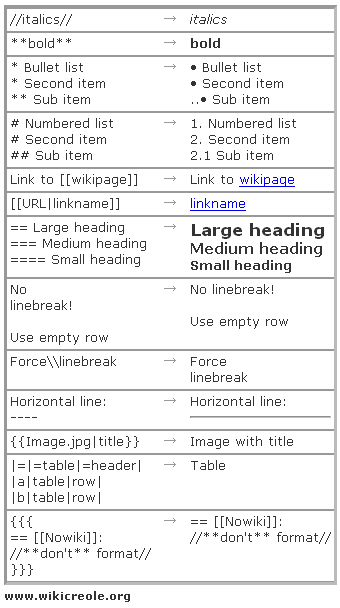 Wiki Creole
Wiki Creole Wiki Creole
Wiki CreoleWikiCreole is intended to be the lingua franca WikiSyntax of the most popular offshoots of wiki around the world, used both for editing directly and as an WikiInterchangeFormat for sharing content between wikis. The beta WikiSyntax was banged out at WikiSym 2006. Apparently, WardsWiki will be one of the test beds! So far, the creole supports MediaWiki-style FreeLinks and preformatted text. Creole has been implemented now in 10 wiki engines and 4 wiki tools. It is currently version 1.0.
Cheat Sheet -- http://www.wikicreole.org/

After a year of diligent effort, a group of nearly 50 dedicated users and developers are proud to release WikiCreole 1.0. Creole is designed to be a common wiki markup language which augments existing markup to enable wiki users to transfer content seamlessly across wikis, a boon to novice and expert users alike.
Creole, taking its name from the field of linguistics, a stable language that originated from a combination of two or more languages. As every wiki software has its own markup definitions, the differences can make them difficult for novices to learn and experts to remember, thus a common wiki markup lays the foundation for development of cross-engine wiki software.
The Creole name for a common markup was born from an idea of wiki founder Ward Cunningham at Wikimania 2006 the international Wikipedia conference. The goal: create a common markup that was not a standardization of an arbitrary existing markup, but rather a new markup language that was created out of the common elements of all existing engines. Under this premise the Wiki Creole Working Group analyzed existing wiki markup and compiled a greatest-common denominator subset of elements and presented its report.
Practitioners and wiki developers were then invited to a workshop at WikiSym 2006 in Denmark to learn about Creole and discuss how to proceed. WikiSym is a symposium (conference) series dedicated to wiki research and practice. Participants evaluated different markup elements for possible unification and added them to a wiki created for this purpose. The resulting data resulted in the first version of the Creole spec, version 0.1. Many workshop participants also agreed to implement Creole into their existing wiki implementations.
In true wiki fashion, the report and data were published to a wider audience who were unable to attend allowing them to discuss the decisions made and add their own proposals. An iterative workflow was introduced that discussed and introduced these new proposals into the spec. Discussion pages were used to address each topic and at the end of each iteration (4-8 weeks), a new version number was added to the spec.
The working group's goal was to emphasize consensus instead of majority rule, so opinion polls were always followed by an attempt to reach mutual agreement. After many long months of cooperation, the working group finally reached a point of maximum commonalities. Creole 1.0 was then frozen for the next two years to allow time for adoption. The WikiCreole site (http://www.wikicreole.org) now has extensive documentation of the empirical analysis and discussions of the elements to support the decisions behind the spec. Today, ten wiki engines support Creole and many more are planning to implement it in the coming months. Wiki engine developers implementing WikiCreole in their parsers, give a clear sign to the community of their readiness to cooperate and draw us all closer together, making life easier for everyone in the wiki world.
With the support of i3G (Interdisciplinary Institute for Intelligent Business Processes; Heilbronn, Germany), Christoph Sauer and Chuck Smith have led the process with great help from the wiki developer community through its initial concept to 1.0. Through their selection of content and personnel, i3G, is trying to overcome the barriers between computer science, engineering and business. They also develop customized concepts for companies to help optimize operational workflow and its representation for IT systems.
 EditText of this page
(last edited September 26, 2008)
or FindPage with title or text search
EditText of this page
(last edited September 26, 2008)
or FindPage with title or text search